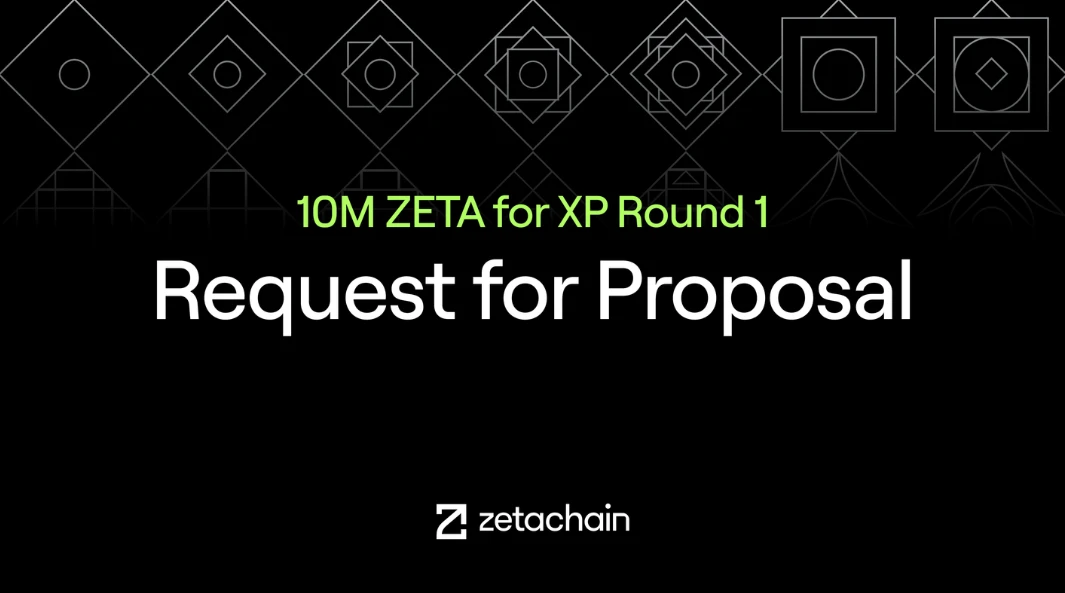The first round of ZetaChain XP airdrop is coming soon.
Ecosystem applications can submit a ZETA Rewards RFP by 00:00 (UTC) on July 1, which also marks the beginning of the first distribution of airdrop rewards for applications. The 90-day XP launch event has ended. The first round of mainnet rewards is mainly based on the first XP user snapshot on May 1, 2024. In order to support the continued growth of the ZetaChain network, this airdrop event puts the power in the hands of ZetaChain ecosystem applications to better determine the ZETA rewards that users can receive based on the XP data layer. This approach ensures that airdrop rewards are distributed to the most core users and XP activities , while enabling the entire ecosystem to participate.
If you have any questions, the AMA on June 18 will provide a good opportunity to ask questions.
80 million ZETA rewards have been distributed in the user growth pool
Since the launch of ZetaChain 1.0, over 80 million ZETA have been distributed to users from the User Growth Pool (UGP) to help attract and reward users on the ZetaChain network.
This includes 31.5 million ZETA distributed to ZetaLabs testnet users when the ZetaChain mainnet beta was launched, and 50 million ZETA used for various marketing activities, including launch pool marketing such as OKX Jumpstart , wallet activities such as OKX Cryptopedia , トークンポケット , ビゲット Task 2 Earn, and social channels such as Galxe Airdrop .
XP airdrop round 1: 10 million ZETA
To incentivize efficient use and growth of the network, ZetaChain announced that 10 million ZETA rewards from UGP will be provided in the first round of XP airdrops.
ZetaChain Ecosystem Application Proposal Request
This airdrop event invites all applications on ZetaChain to submit proposals for analyzing the XP data layer in order to effectively distribute ZETA rewards to XP users. Applications on ZetaChain must submit their request for proposal (RFP) before 00:00 (UTC) on July 1, 2024. After final review and announcement of airdrop allocations, reward distribution can begin as early as July 1, 2024. At that time, the project party can determine the timeline of its airdrop distribution.
Overall, based on the more detailed criteria published below, approximately 419,000 users were eligible for rewards in the first snapshot. These users had at least 200,000 XP in the first phase and demonstrated a high level of loyalty to the program. They completed the majority of activities each week and completed almost all activities that qualified for the XP airdrop, which was a high barrier to entry. While the airdrop was concentrated among these users, it could have included many more users and data (see the guide below).
Beyond adhering to these basic standards, applications will use XP data to determine other user tiers and rewards based on the guidelines. Application submissions include project information, ZETA allocation request, application traction data, proposed airdrop allocation tier, and rationale.
Projects must be submitted ここ by 00:00 (UTC) on 1 July 2024.
qualifications
Projects eligible to submit proposals include teams with active contracts deployed on the ZetaChain mainnet beta and active users. All submissions will need to verify deployment/ownership of their application. Submissions are not limited to applications with active activity in the XP program, any project with actual users and utility can submit. The UGP Committee will conduct a full due diligence on all eligible applications before allocating and distributing rewards.
ガイド
The XP エアドロップ Program allows projects to design their token distribution plans to best reward their users. When creating a proposal, projects should follow the following requirements and guidelines:
-
95% or more of the airdrop shares must be distributed to users.
-
The development team can retain up to 5% of the airdrop share to cover operating costs or support future user growth plans.
-
The majority of users who receive airdrop rewards must have XP ≥ 200,000 in the Phase 1 XP snapshot dataset . This hyperlink points to a compiled dataset of all addresses of the XP snapshots in the 90 days of Phase 1. Applications can use this dataset in conjunction with other on-chain data to determine the appropriate rewards for users. The applications own designed basic criteria and user airdrop allocation level are the screening criteria for the final user airdrop reward allocation.
-
For the tiers of airdrop allocation, applications must follow the following structure: Applications can set up to 15 reward allocation tiers, with a minimum of 5 tiers. Of these, up to 3 tiers can be based on non-XP snapshot data – such as social verification, off-chain data calculations, or data after the XP snapshot. The rationale for the reward tiers must be published or verifiable. All of these requirements are intended to better ensure that rewards are not concentrated in a few centralized parties or addresses.
-
Applications can set up reward mechanisms such as first-come, first-served, proportional distribution based on snapshots, or other methods. Applications should discuss with their community and users to determine the most effective reward method.
-
XP graph data can be used in airdrop distribution, including users who have completed X tasks at least Y times, users who have more than XXX XP, and users who have participated for at least X weeks.
-
Potential on-chain criteria that apps could use in their airdrop distributions could include frequency, total completions, specific task completions, gas expenditures, and overall rank/tier/XP.
-
Applications are encouraged to introduce their own rewards, independent of the ZETA airdrop. Based on the ZETA airdrop, applications can reward users with their own specific portion, which can establish a closer and more special connection between users and applications.
-
Sybil analysis can be used to better reward real users. Any lists or groupings used to filter out these Sybil accounts must be public so that the rationale is publicly traceable.
process
-
Submit a proposal ここ by 00:00 (UTC) on July 1, 2024, verifying the deployment address and providing other information. Applications can publish this information publicly on X and @zetablockchain to increase public visibility and collect feedback before finalizing the airdrop allocation.
-
Upon receipt of submissions, the UGP Committee will contact eligible applications to determine if the application design meets the final airdrop allocation criteria required in the above guidelines.
-
After the airdrop allocation percentages and tiers are determined, airdrops will be allocated from UGP to the application authorization. Any Sybil analysis or screening must be published publicly before allocation is made.
-
After all allocation deliberations are complete, the application must publish its reward allocation and rationale. Applications should publish data through the claim inspection interface or a full data dump.
-
After announcing the reward distribution, the application can begin distributing user rewards. Any failure to distribute rewards correctly, securely, and according to the published data will result in the application being blacklisted from any future reward distribution. Applications can choose to work with the distribution platform TokenTable to allow users to claim their airdrops.
-
All distributions must be completed by October 1, 2024. Any remaining tokens not allocated or distributed will be rolled over into other XP-focused initiatives.
The evolution of the XP data graph
Participation in the XP Loyalty Program enables users to earn rewards. While UGP is the basis for rewards in this specific program, all apps have access to an open XP data layer to ensure users are engaged and rewarded. A new ranking system is under active development that involves not only XP values but also other dimensions such as recent activity and others.
ZetaChain looks forward to feedback from XP event participants and the greater community to shape how future rewards are distributed to drive more sustainable and meaningful network usage.
要約する
XP is the core data and loyalty system that applications and users grow together. The first round of XP airdrop model is the first reward iteration of the XP layer. This program reflects ZetaChain’s commitment to building a thriving, connected community and growing ecosystem. Provide us with feedback during this program, and ZetaChain will continue to improve.
About ZetaChain
ZetaChain is a universal L1 blockchain that serves as the foundational layer of the decentralized internet, providing a platform for global access, simplicity, and utility for any blockchain. ZetaChain’s full-chain smart contracts on a universal EVM are built for universal chain abstractions across the entire crypto ecosystem. ZetaChain can connect to any blockchain, from Ethereum and Cosmos to Bitcoin and beyond, for unified liquidity, user experience, and data, all on one platform. Universal applications on ZetaChain are future-proof and fully integrated and compatible with existing and new chains. With the proposed universal proof-of-stake functionality, ZetaChain supports staking assets like native Bitcoin and Ethereum in exchange for rewards, providing unlimited scale for economic security.
Interested readers can follow @zetablockchain on Twitter and join the discussion on 不和 そして 電報 . Application builders based on ZetaChain can also contact partnerships@zetachain.com .
This article is sourced from the internet: ZetaChain to distribute 10 million ZETA in XP エアドロップ Round 1
Related: Cryptocurrency Politicization, Will Bitcoin Influence the 2024 US Election?
Original author: M6Labs Original translation: TechFlow Trumps shift toward cryptocurrencies and Bidens regulatory stance could affect voter sentiment. As the US presidential election approaches, traditional topics such as foreign policy and culture wars are at the forefront of discussion. However, a new topic seems to have emerged that may play a major role in the countrys election – Bitcoin (and the entire cryptocurrency market). Lets take a look at the rise of cryptocurrency in political discussions. Cryptocurrency and politics Just four years ago, the idea of presidential candidates discussing Bitcoin on the campaign trail seemed far-fetched. However, during last year’s primaries, things began to change dramatically. High-profile candidates such as Ron DeSantis, Vivek Ramaswamy, and Robert F. Kennedy Jr. have attended Bitcoin conferences, appeared on major Bitcoin podcasts, and incorporated…








